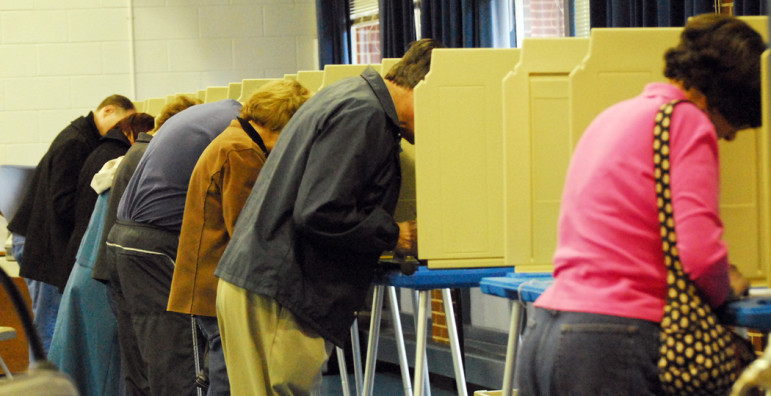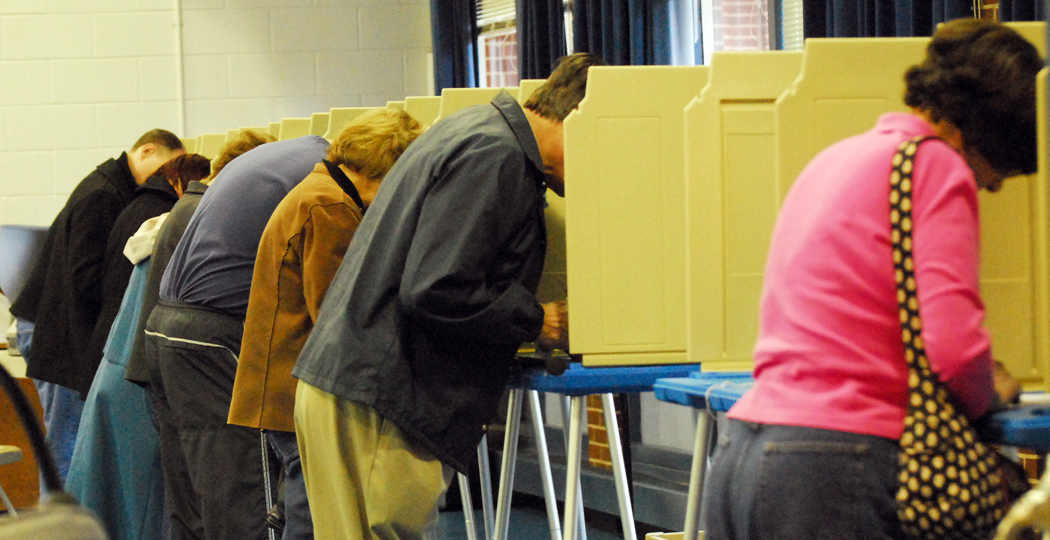If there’s one thing to know before voting this October, it’s that nothing has changed.
You’ll still have 17 days to vote prior to the election. You can still register on the day of. And you likely won’t be challenged over your eligibility to cast a vote. But most importantly, you won’t need to show an ID to submit a ballot (even if you’re an out-of-state student).
The new state election law that has dominated national and local news since Gov. Pat McCrory signed the bill Aug. 12 won’t be in force for this year’s election. And though most tenets of the bill go into effect in 2014, North Carolina voters won’t need a government-issued ID to vote until the 2016 election.
1. Starting in 2016, requires state-issued IDs, passports, veteran’s ID or tribal cards in order to vote. Not accepted: college IDs, public or municipal employee IDs, ID from public-assistance agencies and out-of-state driver’s licenses.
2. Allows voters without a proper ID to cast a provisional ballot.
3. Reduces early voting from 17 days to 10, though the same number of voting hours will be offered.
4. Ends same-day registration. Voters must be registered 25 days in advance of election.
5. Prohibits out-of-precinct voting.
6. Eliminates straight-ticket voting.
7. Ends limits on corporation contributions to political campaigns.
7. Raises the individual campaign contribution limit from $4,000 to $5,000.
8. Reduces disclosure requirements, which previously made clear who is underwriting a campaign.
10. Ends a mandate for high school voter registration drives.
11. Eliminates pre-registration for 16 and 17-year-old residents.
12. Limits compensation for people who sign up others to vote.
13. Allows challenges by any registered voter in the county without cause, and expands who can look at registration records.
14. Allow each political party to deploy additional observers at polling places.
The new voting laws are already being challenged in court. Complaints against all or part of the Republican-sponsored law have already been filed by the NAACP and the Southern Coalition for Social Justice (with the ACLU, League of Women Voters, Common Cause and the A. Philip Randolph Institute).
Meanwhile, state Attorney General Roy Cooper has questioned the law’s intent, and former U.S. Secretary of State Colin Powell spoke out against it at a North Carolina speaking engagement Aug. 22. He claimed state legislators are deliberately making it more difficult for minorities and students to vote.
“It’s the worst voter suppression bill ever passed in North Carolina and undoubtedly the worst in the nation,” said Bob Phillips, executive director of the North Carolina office of the nonpartisan lobbying group Common Cause.
The new voting law may seem to have come about suddenly. And that’s somewhat true. The U.S. Supreme Court in June repealed elements of the Voting Rights Act of 1965, a bill designed by Congress in the civil rights era to prevent discrimination in some southern states and counties, including North Carolina. The act required federal approval to change election laws—but the Supreme Court felt the law was moot today. In 2012, more blacks voted in the south than whites. The law was for a different time, they said.
In the weeks to follow, states began to pass bills to change election laws. The voter ID issue has been a hot-button topic around the nation, with 32 states proposing legislation in the last two years.

McCrory said North Carolina’s voter ID requirement would reduce ballot fraud and bring order and protection back to the election process. But North Carolina’s law turned out to be far more sweeping than that.
Besides the ID requirement coming in 2016 — which could impact as many as 300,000 people without IDs in the state (including 50,000 out-of-state college students) — the law cuts a week from early voting in 2014. In 2012, about 2.5 million people in North Carolina voted early and made up 56 percent of votes cast.
The law also ends same-day registration, of which nearly 100,000 people took advantage in 2012, and eliminates straight-ticket voting. It no longer allows 16- and 17-year-old residents to pre-register to vote when they earn a driver’s license and or take a civics course in high school. It reduces some restrictions on campaign finance.
The law also allows each party to deploy additional observers to polling places and gives any voter the ability to challenge another’s eligibility. Voter advocacy groups will be watching out for abuses of that power, said Brent Laurenz, executive director of the nonpartisan North Carolina Center for Voter Education, but more freedom to challenge could mean delays at polling locations.
“That’s one of the concerns, that there will be concerted efforts to tie up lines if one party is more interested in a certain precinct,” Laurenz said.
Common Cause and the Center for Voter Education will be working with state and local boards of elections in 2014 to educate voters about the changes and to help people get the proper IDs in time for 2016. Out-of-state students, for example, will need to secure free state IDs from the Department of Motor Vehicles, a process that requires four forms of identification.
“In 2013, they don’t have to worry about any of this. They can vote normally,” Laurenz said. “But the important thing for 2014 is that voters will need to get a lot more informed.”
